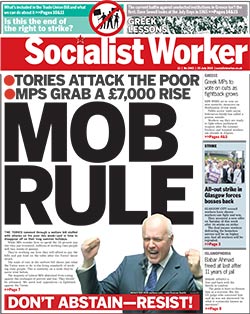Bosses squeeze us for every last penny, low pay report shows
Unpaid overtime, zero hours, no time to eat or for breaks at work— Nick Clark looks at a new report exposing what the Tory claims of economic recovery mean for low paid workers
As MPs saw their salaries soar to £74,000 last week, a report on low paid workers released two days before went largely unnoticed.
But low paid work was pushed to the fore recently as the Tories’ latest budget marked an attack on tax credits, masked by a false “living wage”.
The report, published by the Joseph Rowntree Foundation last Tuesday, is based on experiences described by hospitality, retail and care workers.
It shows how bosses keep wages low while squeezing as much profit as they can out of the people who work for them.
The report suggested that many of the workers interviewed were resigned to low wages but there was plenty of anger over related issues such as unpaid overtime.
One hospitality worker said, “My boss would have to pay me for all of my overtime before I could ever like my job. Apart from Christmas Day, I’ve never been paid any overtime or extra pay.”
Even worse, a lot of workers reported that they were forced to work through their unpaid breaks—leaving them stressed and exhausted.
A community carer from Essex said, “You have absolutely no time. There is no allocated time for breaks.
“I go home at the end of the day and my partner asks me what I’ve had to eat today and I realise I’ve not had anything.”
Other workers say they often have to come into work while sick—because they can’t afford to take time off.
A hospitality worker said, “I had gallstones but I couldn’t face taking the time off work and losing pay to get it sorted.
“I left it for two years and eventually the pain was so bad they had to rush me in and I ended up taking longer off work.”
A related survey for the Foundation found that just 38 percent of low paid workers in the three sectors had scheduled breaks that they always take in full.
And 41 percent said they had gone to work when they were sick.
The report suggested, “The first step to fair pay could be about addressing unpaid overtime and breaks.”
It asked, “Might there be opportunities to enable employees to exchange unused holiday for sick leave?”
But workers’ wages are kept deliberately low so those at the top can make profits.
As one hospitality worker from Essex put it, “We know that they’re paying us as little as they can possibly get away with.”
Bosses won’t pay for breaks or sick leave out of kindness—we have to fight for them.
‘When sales aren’t good they cut our wages’
Many of the workers who spoke to the Foundation reported a high staff turnover in their workplaces. Some of the workers are on zero or low hours contracts.
They reported that their bosses force people out of the job “by giving them the minimum number of hours permissible”.
One bar worker said, “No one, except for managers, has more than a 10-hour contract where I work.”
Many of them also face constantly changing targets, which become ever more unrealistic.
This adds to the pressure on the low paid workers, who know they could be out of a job if they are unable to meet the targets.
One shop worker from Slough said, “There will be a new target from head office every week and it feels like it’s actually impossible to keep up, like you’ll always be behind.”
Precarious employment and performance management such as target setting are often talked about as if they are new.
But bosses have always used the threat of unemployment to keep wages low.
And constantly changing targets forces workers to work harder and harder. So managers can squeeze more and more profits out of their staff for the same small wages.
This becomes more intense during economic crises. When bosses are under pressure to cut costs and make profits, it’s always workers who suffer.
Some of the workers surveyed recognised this. Another shop worker from Slough said, “The problem is that when sales aren’t good everything else is scrutinised heavily.
“Wages are the biggest cost for a retail company, so cutting these will have the biggest impact.”
Shop floors and ivory towers
The report showed that low paid workers felt the sharp divide between themselves and managers.
One hospitality worker said, “I think the management should be taught people skills, because most of them don’t know how to handle people.
“They talk to you like you’re nothing, like a kid or something.”
And a shop worker said, “They sit in their ivory towers saying ‘do this, do that’ when you’re only three people in the shop.”
The report also found that most of the workers knew little about trade unions, or were even suspicious of them.
It said that many of the younger workers were “unable to even guess what benefits or protection a union might offer.”
A related survey found that 21 percent of low paid workers interviewed were members of a union.
Article information
Background Check



 Email
Email Print
Print




 Follow us
Follow us
 Become a fan
Become a fan
 RSS Feed
RSS Feed